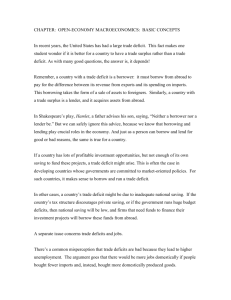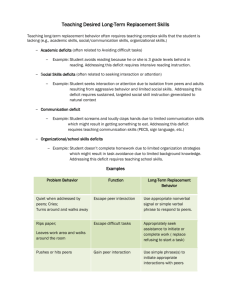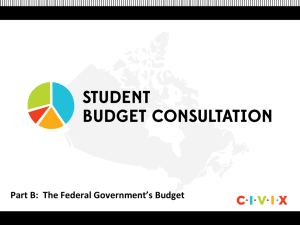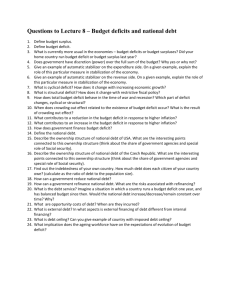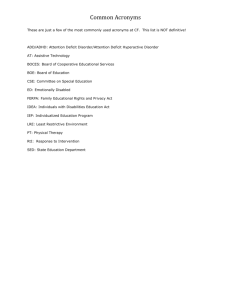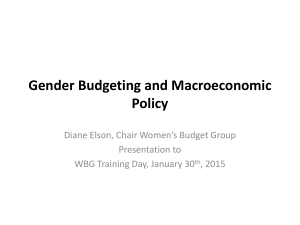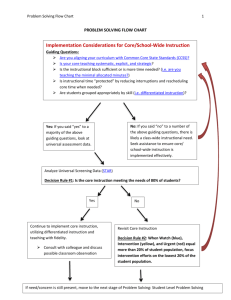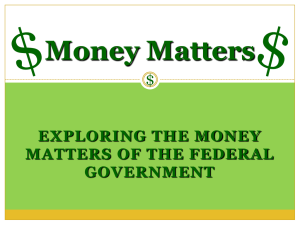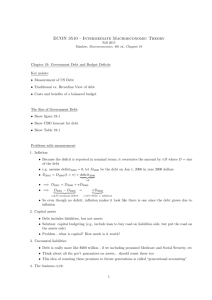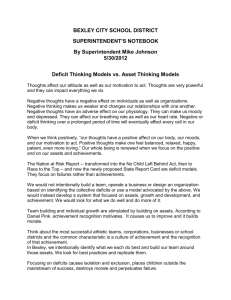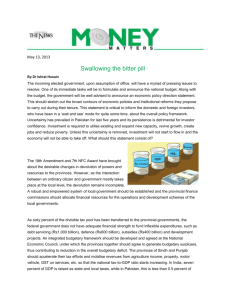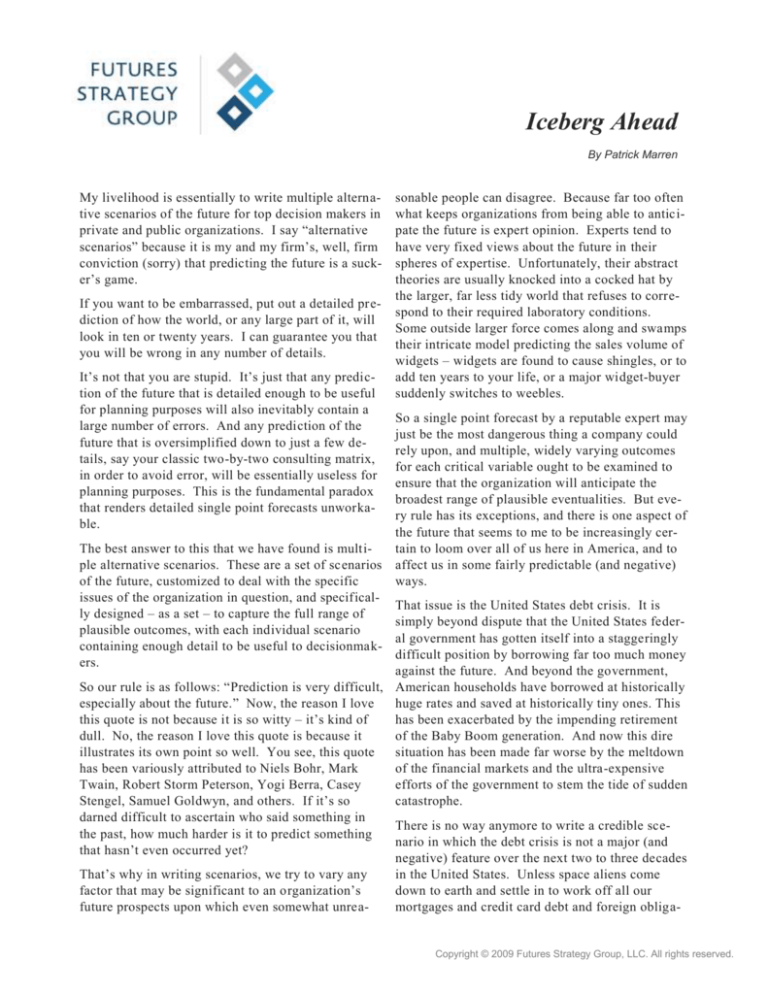
Iceberg Ahead
By Patrick Marren
My livelihood is essentially to write multiple alternative scenarios of the future for top decision makers in
private and public organizations. I say “alternative
scenarios” because it is my and my firm’s, well, firm
conviction (sorry) that predicting the future is a sucker’s game.
If you want to be embarrassed, put out a detailed prediction of how the world, or any large part of it, will
look in ten or twenty years. I can guarantee you that
you will be wrong in any number of details.
It’s not that you are stupid. It’s just that any prediction of the future that is detailed enough to be useful
for planning purposes will also inevitably contain a
large number of errors. And any prediction of the
future that is oversimplified down to just a few details, say your classic two-by-two consulting matrix,
in order to avoid error, will be essentially useless for
planning purposes. This is the fundamental paradox
that renders detailed single point forecasts unworkable.
The best answer to this that we have found is multiple alternative scenarios. These are a set of scenarios
of the future, customized to deal with the specific
issues of the organization in question, and specifically designed – as a set – to capture the full range of
plausible outcomes, with each individual scenario
containing enough detail to be useful to decisionmakers.
sonable people can disagree. Because far too often
what keeps organizations from being able to anticipate the future is expert opinion. Experts tend to
have very fixed views about the future in their
spheres of expertise. Unfortunately, their abstract
theories are usually knocked into a cocked hat by
the larger, far less tidy world that refuses to correspond to their required laboratory conditions.
Some outside larger force comes along and swamps
their intricate model predicting the sales volume of
widgets – widgets are found to cause shingles, or to
add ten years to your life, or a major widget-buyer
suddenly switches to weebles.
So a single point forecast by a reputable expert may
just be the most dangerous thing a company could
rely upon, and multiple, widely varying outcomes
for each critical variable ought to be examined to
ensure that the organization will anticipate the
broadest range of plausible eventualities. But every rule has its exceptions, and there is one aspect of
the future that seems to me to be increasingly certain to loom over all of us here in America, and to
affect us in some fairly predictable (and negative)
ways.
That issue is the United States debt crisis. It is
simply beyond dispute that the United States federal government has gotten itself into a staggeringly
difficult position by borrowing far too much money
against the future. And beyond the government,
So our rule is as follows: “Prediction is very difficult, American households have borrowed at historically
especially about the future.” Now, the reason I love
huge rates and saved at historically tiny ones. This
this quote is not because it is so witty – it’s kind of
has been exacerbated by the impending retirement
dull. No, the reason I love this quote is because it
of the Baby Boom generation. And now this dire
illustrates its own point so well. You see, this quote
situation has been made far worse by the meltdown
has been variously attributed to Niels Bohr, Mark
of the financial markets and the ultra-expensive
Twain, Robert Storm Peterson, Yogi Berra, Casey
efforts of the government to stem the tide of sudden
Stengel, Samuel Goldwyn, and others. If it’s so
catastrophe.
darned difficult to ascertain who said something in
There is no way anymore to write a credible scethe past, how much harder is it to predict something
nario in which the debt crisis is not a major (and
that hasn’t even occurred yet?
negative) feature over the next two to three decades
That’s why in writing scenarios, we try to vary any
in the United States. Unless space aliens come
factor that may be significant to an organization’s
down to earth and settle in to work off all our
future prospects upon which even somewhat unreamortgages and credit card debt and foreign obliga-
Copyright © 2009 Futures Strategy Group, LLC. All rights reserved.
Iceberg Ahead
tions, we are in for a long period of adjustment. In
the words of Addison Wiggin and Kate Incontrera in
their book IOUSA: One Nation, Under Stress, in
Debt, the government is not going to be able to help
us out much if current levels of entitlements are not
altered:
By 2012, the federal government will stop
doing 1 in 10 things it is doing now… By
2020, the government will stop doing 1 in 4.
…By 2030 the federal government will stop
performing half the services it provides. …By
2050 Social Security, Medicare, and Medicaid will consume nearly the entire federal
budget.
declined into negative territory. That is, Americans, as a country, were not only not saving any
money at all, they were net borrowers. Now, all
investment in the nation eventually comes from
savings. Short-term, foreign money and loose central bank policy can increase the funds available for
investment, but in the long term, only real domestic
savings can allow investment to continue on any
kind of healthy basis. A country with huge fiscal
deficits and dwindling economic prospects and a
large demographic cohort retiring all at once is not
one that is likely to have increasing savings rates.
The trade deficit means we are importing more than
we are exporting. In other words, as a nation, we
are consuming more than we are producing. We
Of course, this bleak scenario assumes that things go
are sending a lot more money to China for their
along as they are now without any change. This is
goods than they are sending their money to us for
not necessarily a realistic assumption. Things could
our goods. There is a difference of opinion among
actually be far worse than this. For one thing, these
economists over the ultimate impact of trade defiestimates did not take into account the economic discits. But most experts seem to believe that large,
location that has hit the United States, nor the maspersistent trade deficits eventually put the countries
sive near-trillion dollar bailout package that the
running them into difficulties, as the countries with
government passed last fall. For another, the effects
which they trade buy up their assets with their curof the oil price spikes have not been fully taken into
rency. America’s trade deficits had reached record
account.
highs in 2007: $262 billion with China, $117 bilFormer Comptroller General David Walker, an allion with oil exporting countries, $99 billion with
most universally revered figure in the government
Canada (another oil-producing country), $91 billion
(quite an accolade in these politically fractious
with Mexico, $87 billion with Japan. China leads
times), says that we are suffering from four deficits: a the world in overall manufacturing, production of
federal budget deficit, a personal savings deficit, a
steel, and in numerous other areas; they also have
national trade deficit, and what he calls “the leaderthe largest trade surplus. The U.S., on the other
ship deficit.”
hand, has the largest net trade deficit in the world.
The single largest holder of U.S. government debt
The federal budget deficit is not all that bad by some
is the Chinese government.
historical standards. We carried a larger deficit under Reagan, as a percentage of gross domestic prodThe expected result of this trade deficit situation
uct. What makes the current deficits a problem is the would be higher interest rates for U.S. government
fact that we as a people have promised gargantuan
debt, which is the interest rate you and I pay to borsums as entitlements to people in the form of Social
row the money we do not save in order to keep our
Security, Medicare and Medicaid over the next twen- economy and government and military going. The
ty-odd years. These programs will add about $40
worst outcome would be the Chinese dumping our
trillion to our current $10 trillion national debt over
debt, but this would harm the Chinese at least as
the next four decades, unless something changes.
much as it would harm us, since the value of their
And the economic effects of this debt may be stagdollar reserves would dive long before they could
gering: some combination of a shriveling dollar, inunload all of them. But a gradual buying up of
flation, higher interest rates, higher taxes, and stunted U.S. assets and significant rise in interest rates on
economic growth.
theoretically “riskless” U.S. debt would have very
real negative consequences on America and AmeriThe personal savings deficit is similar in its impacts.
cans.
In the 1960s, the national savings rate in the United
States reached a high of 13.6%. By 2005-6, it had
Copyright © 2009 Futures Strategy Group, LLC. All rights reserved.
Iceberg Ahead
There is no real prospect in the near future for any of
these deficit situations to reverse themselves in a way
that will benefit the United States. The U.S., representing less than 5% of the population of the earth,
last year borrowed 65% of all the money borrowed in
the world.
And this is the result of the fourth deficit Walker
mentions, “the leadership deficit.” Our system of
government may be facing its greatest test, hiding
in plain sight. No one wants higher taxes; no one
wants fewer government services. And so, unless
these facts change, it will be inflation, higher interest rates, and stunted investment. And even if our
That’s why I say that this particular subject is going
current polarized politics yields to common sense,
to be a prominent feature of the near and mid-term
abandons the blame game, and hammers out some
future of the United States, no matter what. Its parsort of deal to balance entitlements and taxes, we
ticular character, and the particular ill effects of the
are still going to have to go on some sort of nationimbalances, will depend on government and societal
al diet. (And I’m going to be the last guy in line
responses to the fix we are in. But it cannot seriously
among the Baby Boomers with my hand out, and
be disputed that we will be suffering in some way
I’m going to get a piece of coal.)
from this fiscal dislocation for a very long time, with
some combination of higher interest rates, foreign
And this fact will limit consumer spending, restrict
ownership of formerly American assets, longer hard- the prospects of virtually every economic organizaer work hours and careers for Americans, a depressed tion in this country, and will limit the strategic
stock market, serious inflation, vastly reduced govchoices available to business leaders.
ernment services and entitlements, and higher taxes.
In The Sun Also Rises, Ernest Hemingway has two
It’s an iceberg off our bow, and it is coming straight
characters discussing quite a similar topic, the retoward us, and so far absolutely nothing has been
cent bankruptcy of one of them, a constantly
done about it. No matter who has won the presidendrunken, previously wealthy British aristocrat:
tial election (still a month off as I write this), he will
“How did you go bankrupt?” Bill asked.
have won without addressing this largest of long term
national issues in any serious way at all (and proba“Two ways,” Mike said. “Gradually and then sudbly without seriously addressing the financial crisis,
denly.”
either). No country has ever retained its military suWe’ve been through the gradual part, and we may
periority while simultaneously squandering its ecobe in the sudden part now.
nomic superiority. Running long-term deficits over
decades is the quickest path toward second-tier naIt’s the aftermath that may make us wish we were
tional status. Unless we make serious changes, this is all drunk.
where we are headed.
*
*
*
Originally published in Journal of Business Strategy, Volume 30, Issue 1 (2009).
Patrick Marren is an FSG principal.
Copyright © 2009 Futures Strategy Group, LLC. All rights reserved.

